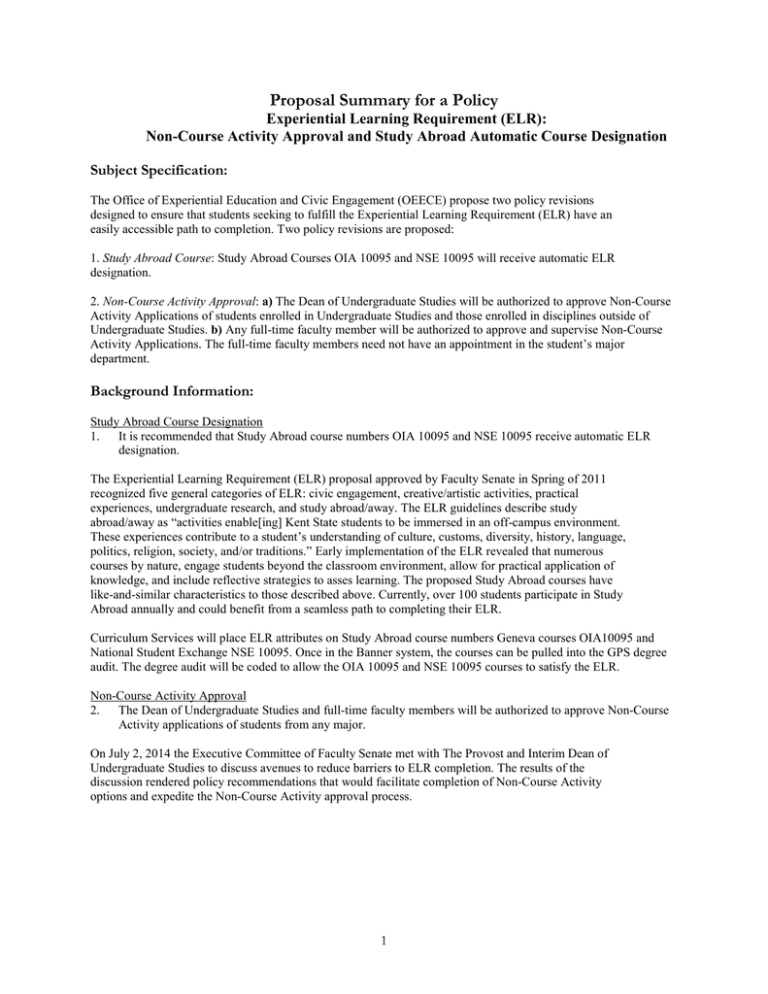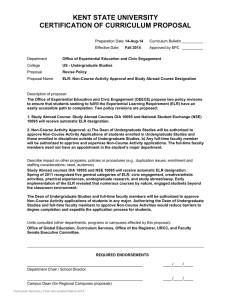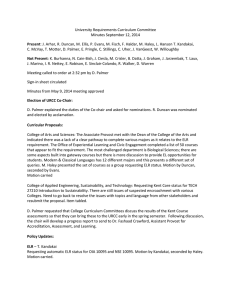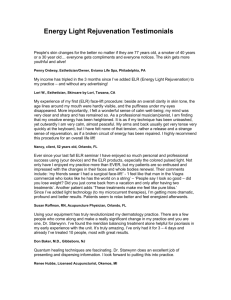Proposal Summary for a Policy
advertisement

Proposal Summary for a Policy Experiential Learning Requirement (ELR): Non-Course Activity Approval and Study Abroad Automatic Course Designation Subject Specification: The Office of Experiential Education and Civic Engagement (OEECE) propose two policy revisions designed to ensure that students seeking to fulfill the Experiential Learning Requirement (ELR) have an easily accessible path to completion. Two policy revisions are proposed: 1. Study Abroad Course: Study Abroad Courses OIA 10095 and NSE 10095 will receive automatic ELR designation. 2. Non-Course Activity Approval: a) The Dean of Undergraduate Studies will be authorized to approve Non-Course Activity Applications of students enrolled in Undergraduate Studies and those enrolled in disciplines outside of Undergraduate Studies. b) Any full-time faculty member will be authorized to approve and supervise Non-Course Activity Applications. The full-time faculty members need not have an appointment in the student’s major department. Background Information: Study Abroad Course Designation 1. It is recommended that Study Abroad course numbers OIA 10095 and NSE 10095 receive automatic ELR designation. The Experiential Learning Requirement (ELR) proposal approved by Faculty Senate in Spring of 2011 recognized five general categories of ELR: civic engagement, creative/artistic activities, practical experiences, undergraduate research, and study abroad/away. The ELR guidelines describe study abroad/away as “activities enable[ing] Kent State students to be immersed in an off-campus environment. These experiences contribute to a student’s understanding of culture, customs, diversity, history, language, politics, religion, society, and/or traditions.” Early implementation of the ELR revealed that numerous courses by nature, engage students beyond the classroom environment, allow for practical application of knowledge, and include reflective strategies to asses learning. The proposed Study Abroad courses have like-and-similar characteristics to those described above. Currently, over 100 students participate in Study Abroad annually and could benefit from a seamless path to completing their ELR. Curriculum Services will place ELR attributes on Study Abroad course numbers Geneva courses OIA10095 and National Student Exchange NSE 10095. Once in the Banner system, the courses can be pulled into the GPS degree audit. The degree audit will be coded to allow the OIA 10095 and NSE 10095 courses to satisfy the ELR. Non-Course Activity Approval 2. The Dean of Undergraduate Studies and full-time faculty members will be authorized to approve Non-Course Activity applications of students from any major. On July 2, 2014 the Executive Committee of Faculty Senate met with The Provost and Interim Dean of Undergraduate Studies to discuss avenues to reduce barriers to ELR completion. The results of the discussion rendered policy recommendations that would facilitate completion of Non-Course Activity options and expedite the Non-Course Activity approval process. 1 Proposal Summary for a Policy Non-Course Activity Approval Routing A student who seeks to fulfill the ELR through a non-course option may seek guidance in identifying an activity from a faculty member and/or the OEECE. A student must complete a Non-Course Activity application and submit it to a full-time faculty member or OEECE for review. If the application is deemed acceptable, a signature of approval will be obtained from a full-time supervising faculty member or Dean of Undergraduate Studies. Non-Course Activity Registration and Notification To facilitate early tracking and notification of student applicants, OEECE will send notification of application approval to the student, supervising faculty member, and designee in the student’s college. Non-Course Activity Completion Process Upon completion of the activity, the student will sign the Non-Course Activity Completion Form and obtain confirmation signatures from the site supervisor, supervising faculty member, and submit it to OEECE for processing. OEECE will notify the student, supervising faculty member, designee in the student’s college, and the Office of the Registrar for acknowledgement on the student’s transcript. Alternatives and Consequences: The alternative to not providing automatic designation to Study Abroad courses is that participating students will need to seek additional means of fulfilling the ELR. Consequently, students may spend more time and costs associated with an additional course or Non-course Activity enrollment. The alternative to not authorizing full-time faculty members and the Dean of Undergraduate Studies to approve Non-Course Activity experiences is that students may only seek ELR approval from faculty members teaching in their program major. As a consequence, faculty member availability may fall short of student needs and demand. Thus, there is a potential risk of delaying ELR enrollment and progress toward degree completion. Specific Recommendation and Justification: 1. The recommendation is to provide automatic ELR designation to Study Abroad courses. Early recognition of how courses such as student teaching, practicum, internships, and clinicals by nature, meet the spirit and standards of experiential learning resulted in automatic ELR designation of these courses.Study Abroad courses sponsored through the Office of Global Education also meet the spirit and standards of experiential learning. For example, students may spend between two-weeks to one year immersed in learning from and within diverse cultural environments, apply knowledge and skills in different contexts, and reflect on the meaning of the experience. 2. It is also recommended that full-time faculty members and the Dean of Undergraduate Studies are authorized to approve Non-Course Activity applications of students enrolled in any major program of study. Current policy language states: "students must obtain prior approval from their program faculty for the experience." Authorizing the Dean of Undergraduate Studies and full-time faculty members to approve Non-Course Activities would reduce barriers to completion and ease the application process for students. Timetable and Actions Required: • • • • • Identification of Study Abroad courses by the Office of Global Education (August, 2014) Approval of Study Abroad courses by URCC (September, 2014) Approval of Study Abroad courses by EPC (October, 2014) Approval of Study Abroad courses by Faculty Senate (November, 2014) Implementation (Fall 2015) 2 Proposal Summary for a Policy • Approval to authorize the Dean of Undergraduate Studies and full-time faculty members to approve NonCourse Activity applications of students enrolled in any disciplinary major (September, 2014) o Implementation (Fall 2014) 3


